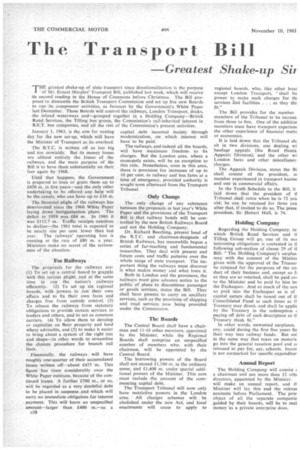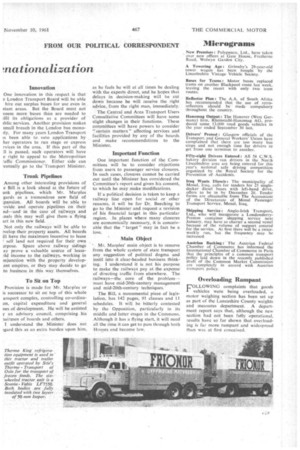The Transport Bill
Page 78

Page 79

If you've noticed an error in this article please click here to report it so we can fix it.
Greatest Shake-up Sir !nationalization
THE greatest shake-up of state transport since denationalization is the purpose of Mr. Ernest Marples' Transport Bill, published last week, which will receive its second reading in the House of Commons before Christmas. The Bill proposes to dismantle the British Transport Commission and set up five new Boards to run its component activities, as forecast by the Government's White Paper last December. These Boards will control the railways, London Transport, docks, the inland waterways and—grouped together in a Holding Company—British Road Services, the Tilling bus group, the Commission's rail-inherited interest in B.E.T. bus companies, and all the rest of the Commission's present activities.
January 1, 1963, is the aim for vesting day for the new set-up, which will have the Minister of Transport as its overlord.
The B.T.C. is written off as too big and too unwieldy. But its money losses are almost entirely the losses of the railways, and the main purpose of the Bill is to have them substantially on their. feet again by 1968.
Until that happens, the Government is prepared to loan or grant them up to £450 m. in five years—and the only other undertaking to be offered any help will be the canals, who can have up to £10 iii.
The financial plight of the railways has deteriorated since the 1960 White Paper laying down re-organization plans. The deficit in 1959 was £84 m. In 1960 it was £112.7 m.. Traffic receipts continue to decline—the 1961 total is expected to be nearly one per cent lower than last year. The railways' operating loss is running at the rate of £80 m. a year. Ministers. make no secret of the seriousness of the situation:
For Railways
The proposals for the railways are (I) To set up a central board to grapple with this serious plight, and at the same time to run the nation's railways efficiently. (2) To set up six regional boards, with powers. to run their own affairs and to fix their own fares and charges free from outside control. (3) To release the railways from statutory obligations to provide certain services to traders and others, and to act as common carriers. (4) To allow them to develop or capitalize on their property and land where advisable, and (5) to make it easier to bring about a system of the right size and shape—in other words to streamline the closure procedure for branch rail lines.
Financially, the railways will have roughly one-quarter of their accumulated losses written off—about £475 "m„. This figure has risen considerably over the White Paper estimate, because of the continued losses. A further £700 m., or so,• will be regarded as a very doubtful debt to be placed in suspense. and which will carry no immediate obligation for interest payment. This will leave an unspecified amount—larger than £400 m.—as a
c28 capital debt incurred mainly through modernization, on which interest will have to be paid.
The railways, and indeed all the boards, will have maximum freedom to fix charges. But the London area, where a monopoly exists, will be an exception to this rule. Nonetheless, even in this area, there is provision for increases of up to 10 per cent in railway and bus fares at a time of emergency, provided authority is sought soon afterward from the Transport Tribunal.
Only Change
The only change of any substance between the proposals in last year's White Paper and the provisions of the Transport Bill is that railway hotels will be controlled by the new British Railways Board and not the Holding Company.
Dr. Richard Beeching, present head of the B.T.C. and chairman-designate of British Railways, has meanwhile begun a series of far-reaching and fundamental researches. They deal with present and future costs and traffic patterns over the whole range of state transport. The important thing the railways must discover is what makes money and what loses it.
Both in London and the provinces, the railways must give advance notice to the public of plans to discontinue passenger or goods services, states the Bill. They shall have powers to carry on ancillary services, such as the provision of shipping and road services now being provided under the Corn mission.
The Boards
The Central Board shall have a chairman and 11-18 other members, appointed by the Minister, while the Regional Boards shall comprise an unspecified number of members who, with their chairmen, will be appointed by the Central Board.
The borrowing powers of the Board shalt not exceed £1,100 m. in the ordinary sense, and £1,400 m. under special additional powers of the Minister. This sum must include the amount of the commencing capital debt.
The Transport Tribunal will now only have restrictive powers in the London area. All charges schemes will be abolished under the new Act, and local enactments will cease to apply to regional boards, who, like other boar except London Transport, " shall ha power to make such charges for thi services Ind facilities . . . as they thii fit."
The Bill provides for the number members of the Tribunal to be inereas. from three to five. One of the addition members must have transport experienr the other experience of financial mattc or economics.
It is laid down that the Tribunal sh: sit in two divisions, one dealing wi haulage appeals (the Road Hauls Appeals Division), and the other wi London fares and other miscellaneo charges.
The Appeals Division, states the Bi shall consist of the president, oi member experienced in transport busine and one in commercial affairs.
In the Tenth Schedule to the Bill, it laid down that the president of tl Tribunal shall retire when he is 72 yea old; he can be retained for three yea after that, if invited to do so. The prese president, Sir Hubert Hull, is 74.
Holding Company Regarding the Holding Company, in which British Road Services and tl Tilling Group will go, one of its mo interesting obligations is contained in tt following sub-section of clause 29 of ti Bill: "The Holding Company's surplus, may with the consent of the Ministe given with the approval of the Tieasur be retained for the purposes of the coi duct of their business and, except so fi as they are so retained, shall be paid ovi to the Minister and be paid by him MI the Exchequer. And so much of the sun so paid into the Exchequer as is of capital nature shall be issued out of tt Consolidated Fund at such times as ti Treasury may direct, and shall be applic by the Treasury in the redemption paying off debt of such description as ft Treasury think fit."
In other words, unwanted surpluses. any, could during the first five years fin their way into railway funds. But onl in the same way that taxes on motoris go into the general taxation pool and al reissued to pay for, say, schools. Incon is not earmarked for specific expenditur
Annual Report The Holding Company will consist a chairman and not more than 12 calm directors, appointed by the Minister. will make an annual report, and a Minister will lay this and the releval accounts before Parliament. The prirr object of all the separate companie guided by their boards, will be to mat money as a private enterprise does. innovation
One innovation in this respect is that
e London Transport Board will be able hire out surplus buses for use even in stant areas. But the Board must not issess more buses than are needed to lfil its obligations as a provider of iblic services. Another provision makes small breach in the London bus mono
For many years London Transport is been able to veto applications by her operators to run stage or express rvices in the area If this part of the 11 is passed, such operators will have e right to appeal to the Metropolitan !affic Commissioner. Either side can 'entually go to the'Transport Minister.
Trunk Pipelines
Among other interesting provisions of e Bill is a look ahead at the future of unk pipelines, which Mr. Marples gards as a tremendous new field of :pansion. All boards will be able to .ovide and operate . pipelines on their nd—and in the case of railways and ,nals this may well give them a flying art in this new field.
Not only the railways will be able to welop their property assets. All boards ill have the maximum incentive to lease sell land not required for their own arpose. Space above railway sidings ay prove a valuable source of lease)1d income to the railways, working in injunction with the property develop-. ent empires, or they may decide to go to business in this way themselves.
To Sit on Top
Provision is made for Mr. Mar pies or is successor to sit on top of this whole ansport complex, controlling co-ordinaon, capital expenditure and general ties of development. He will be assisted y an advisory council, comprisinghis lairmen of boards and others.
I understand the Minister does not lard this as an extra burden upon him, as he feels he will at all times be dealing with the experts direct, and he hopes that delays in decision-making will be cut down because he will receive the right advice, from the right man, immediately.
The Central and Area Transport Users Consultative Committees will have some slight changes in their functions. These committees will have powers to consider " certain matters" affecting services and facilities provided by any of the boards and make recommendations to the Minister.
Important Function
One important function of the Committees will be to consider objections from users to passenger service closures. In such cases, closures cannot be carried out until the Minister has considered the Committee's report and given his consent, to which he may make modifications.
If a political decision is taken to keep a railway line open for social or other reasons, it will be for Dr. Beeching to go to the Minister and request a revision of his financial target in this particular region. In places where many closures are economically necessary, it is conceivable that the " target" may in fact be a loss,
Main Object
' Mr. Marples' main object is to remove from the whole system of state transport any suggestion of political dogma and instil into it clear-headed business thinking. I understand it is not his purpose to make the railways pay at the expense of directing traffic from elsewhere. The railwaysthe . core of the problem— must have mid-20th-century management and mid-20th-century techniques.
The Bill, a monumental piece of legislation, has 142 pages, 91 clauses and 11 schedules. It will be bitterly contested by the Opposition, particularly in its middle and latter stages in the Commons. Although it has a flying start, it will need all the time it can get to pass through both Houses and become law.
Overloading Rampant
L'OLLOWING complaints that goods
vehicles were being overloaded, a motor weighing section has been set up as part of the Lancashire County weights and measures department. A department report says that, although the new section had not been fully operational, results have so far shown that overloading is far more rampant and widespread than was at first conceived.








































































































































































































































































